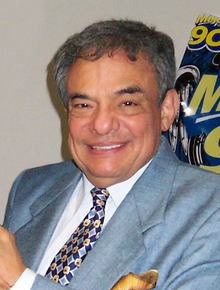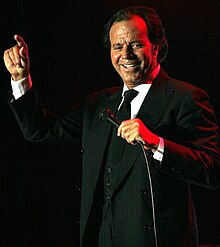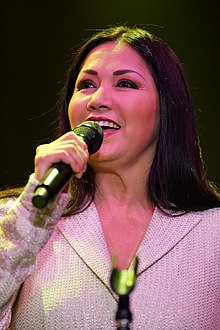In June 1985, Billboard magazine established Latin Pop Albums, a chart that ranks the best-selling Latin pop albums in the United States. The chart was published on a fortnightly basis with its positions being compiled by sales data from Latin music retailers and distributors.[1][2] According to Billboard, Latin pop includes "the music known as the balada romántica or música interacional" as well as "young pop sounds" and "the new Spanish-language rock".[3] Latin pop emerged as the most commercially successful genre of Latin music throughout the 1980s and 1990s in the US,[4] and the popularity of the balada was propelled by artists such as Julio Iglesias, Camilo Sesto, and Gloria Estefan (lead singer of the Miami Sound Machine at the time).[5] During the 1980s, 22 albums topped the chart.

The first album to reach number one on the Latin Pop Album chart was Reflexiones (1984) by José José.[1] José José was also the artist with the most number-one albums of the 1980s with Promesas (1985), Siempre Contigo (1986), and Soy Así (1987).[6] The three records were the best-selling Latin pop albums of 1986–88, respectively.[7][8][9] Promesas was the longest-running number one with 17 weeks.[6] The Miami Sound Machine was the only band to reach number one in the 1980s with their album Primitive Love (1985). Primitive Love spawned the crossover single, "Conga",[10] which peaked at number ten on the Billboard Hot 100 chart.[11]
Iglesias and Emmanuel were the only other artists to have more than two chart-toppers. Iglesias, who has been recognized as the best-selling male Latin artist of all-time by the Guinness World Records,[12] spent a total of 29 weeks at the apex of the chart with his albums Libra (1985), Un Hombre Solo (1987), and Raíces (1989).[13] Five female acts reached number one on the chart during the 1980s: Ángela Carrasco, Ana Gabriel, Rocío Jurado, Yolandita Monge, and Isabel Pantoja. Pantoja had the best-selling Latin pop album of 1989 with Desde Andalucía (1988) and won the Lo Nuestro Award for Pop Album of the Year in the same year.[14][15] Gabriel culminated the decade with Tierra de Nadie (1988). Recognized as her breakthrough album, it won the Pop Album of the Year award at the following Lo Nuestro Awards.[15][16]
Chart history



| † | Indicates best-selling Latin pop album of the year |
| Contents |
|---|
| Issue date | Album | Artist(s) | Ref. |
|---|---|---|---|
| June 29, 1985 | Reflexiones | José José | [17] |
| July 13, 1985 | [18] | ||
| July 27, 1985 | [19] | ||
| August 10, 1985 | [20] | ||
| August 24, 1985 | [21] | ||
| September 7, 1985 | [22] | ||
| September 21, 1985 | [23] | ||
| October 5, 1985 | [24] | ||
| October 19, 1985 | Libra | Julio Iglesias | [25] |
| November 2, 1985 | [26] | ||
| November 16, 1985 | [27] | ||
| November 30, 1985 | [28] | ||
| December 14, 1985 | [29] | ||
| December 28, 1985 | Primitive Love | Miami Sound Machine | [30] |
| January 11, 1986 | [31] | ||
| January 25, 1986 | [32] | ||
| February 8, 1986 | Promesas †[7] | José José | [33] |
| February 22, 1986 | [34] | ||
| March 8, 1986 | [35] | ||
| March 22, 1986 | [36] | ||
| April 5, 1986 | [37] | ||
| April 19, 1986 | [38] | ||
| May 3, 1986 | Paloma Brava | Rocío Jurado | [39] |
| May 17, 1986 | [40] | ||
| May 31, 1986 | Promesas †[7] | José José | [41] |
| June 14, 1986 | [42] | ||
| June 28, 1986 | [43] | ||
| July 12, 1986 | [44] | ||
| July 26, 1986 | [45] | ||
| August 9, 1986 | [46] | ||
| August 23, 1986 | [47] | ||
| September 6, 1986 | [48] | ||
| September 20, 1986 | [49] | ||
| October 4, 1986 | [50] | ||
| October 18, 1986 | [51] | ||
| November 1, 1986 | Toda la Vida y Otros Grandes Exitos | Emmanuel | [52] |
| November 15, 1986 | Siempre Contigo †[8] | José José | [53] |
| November 29, 1986 | [54] | ||
| December 13, 1986 | [55] | ||
| December 27, 1986 | [56] | ||
| January 10, 1987 | [57] | ||
| January 24, 1987 | [58] | ||
| February 7, 1987 | [59] | ||
| February 21, 1987 | [60] | ||
| March 7, 1987 | Solo | Emmanuel | [61] |
| March 21, 1987 | Siempre Contigo †[8] | José José | [62] |
| April 4, 1987 | Solo | Emmanuel | [63] |
| April 18, 1987 | Siempre Contigo †[8] | José José | [64] |
| May 2, 1987 | Lo Bello y lo Prohibido | Braulio | [65] |
| May 16, 1987 | [66] | ||
| May 30, 1987 | [67] | ||
| June 13, 1987 | Un Hombre Solo | Julio Iglesias | [68] |
| June 27, 1987 | [69] | ||
| July 11, 1987 | [70] | ||
| July 25, 1987 | [71] | ||
| August 8, 1987 | [72] | ||
| August 22, 1987 | [73] | ||
| September 5, 1987 | [74] | ||
| September 19, 1987 | [75] | ||
| October 3, 1987 | [76] | ||
| October 17, 1987 | [77] | ||
| October 31, 1987 | [78] | ||
| November 14, 1987 | [79] | ||
| November 28, 1987 | [80] | ||
| December 12, 1987 | [81] | ||
| December 26, 1987 | [82] | ||
| January 16, 1988 | Soy Así †[9] | José José | [83] |
| January 30, 1988 | [84] | ||
| February 13, 1988 | [85] | ||
| February 27, 1988 | [86] | ||
| March 12, 1988 | [87] | ||
| March 26, 1988 | [88] | ||
| April 9, 1988 | [89] | ||
| April 23, 1988 | [90] | ||
| May 7, 1988 | [91] | ||
| May 21, 1988 | Entre Lunas | Emmanuel | [92] |
| June 4, 1988 | [93] | ||
| June 18, 1988 | Señor Corazón | José Luis Rodríguez | [94] |
| July 2, 1988 | [95] | ||
| July 16, 1988 | [96] | ||
| July 30, 1988 | [97] | ||
| August 13, 1988 | [98] | ||
| August 27, 1988 | [99] | ||
| September 10, 1988 | Amor Libre: 12 Grandes Exitos | Camilo Sesto | [100] |
| September 24, 1988 | [101] | ||
| October 8, 1988 | Vivencias | Yolandita Monge | [102] |
| October 22, 1988 | Amor Libre: 12 Grandes Exitos | Camilo Sesto | [103] |
| November 5, 1988 | Con Todos los Sentidos | Braulio | [104] |
| November 19, 1988 | Vivencias | Yolandita Monge | [105] |
| December 3, 1988 | Boca Rosa | Ángela Carrasco | [106] |
| December 17, 1988 | Desde Andalucía †[14] | Isabel Pantoja | [107] |
| December 31, 1988 | [108] | ||
| January 14, 1989 | [109] | ||
| January 28, 1989 | [110] | ||
| February 11, 1989 | [111] | ||
| February 25, 1989 | [112] | ||
| March 11, 1989 | [113] | ||
| March 11, 1989 | [114] | ||
| March 25, 1989 | [115] | ||
| April 8, 1989 | Ricardo Montaner | Ricardo Montaner | [116] |
| April 22, 1989 | Desde Andalucía †[14] | Isabel Pantoja | [117] |
| May 6, 1989 | [118] | ||
| May 20, 1989 | [119] | ||
| June 3, 1989 | Roberto Carlos '88 | Roberto Carlos | [120] |
| June 17, 1989 | Desde Andalucía †[14] | Isabel Pantoja | [121] |
| July 1, 1989 | [122] | ||
| July 15, 1989 | Raíces | Julio Iglesias | [123] |
| July 29, 1989 | [124] | ||
| August 12, 1989 | [125] | ||
| August 26, 1989 | [126] | ||
| September 9, 1989 | [127] | ||
| September 23, 1989 | [128] | ||
| October 7, 1989 | [129] | ||
| October 21, 1989 | [130] | ||
| November 4, 1989 | [131] | ||
| November 18, 1989 | Tierra de Nadie | Ana Gabriel | [132] |
| December 2, 1989 | [133] | ||
| December 16, 1989 | [134] | ||
| December 30, 1989 | [135] |